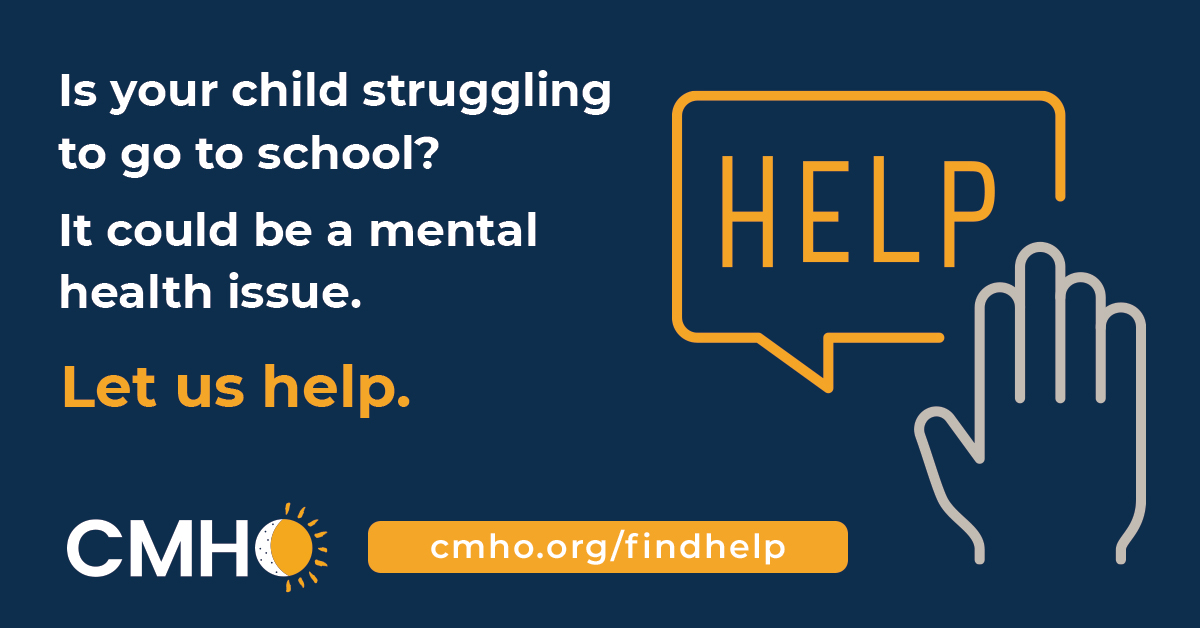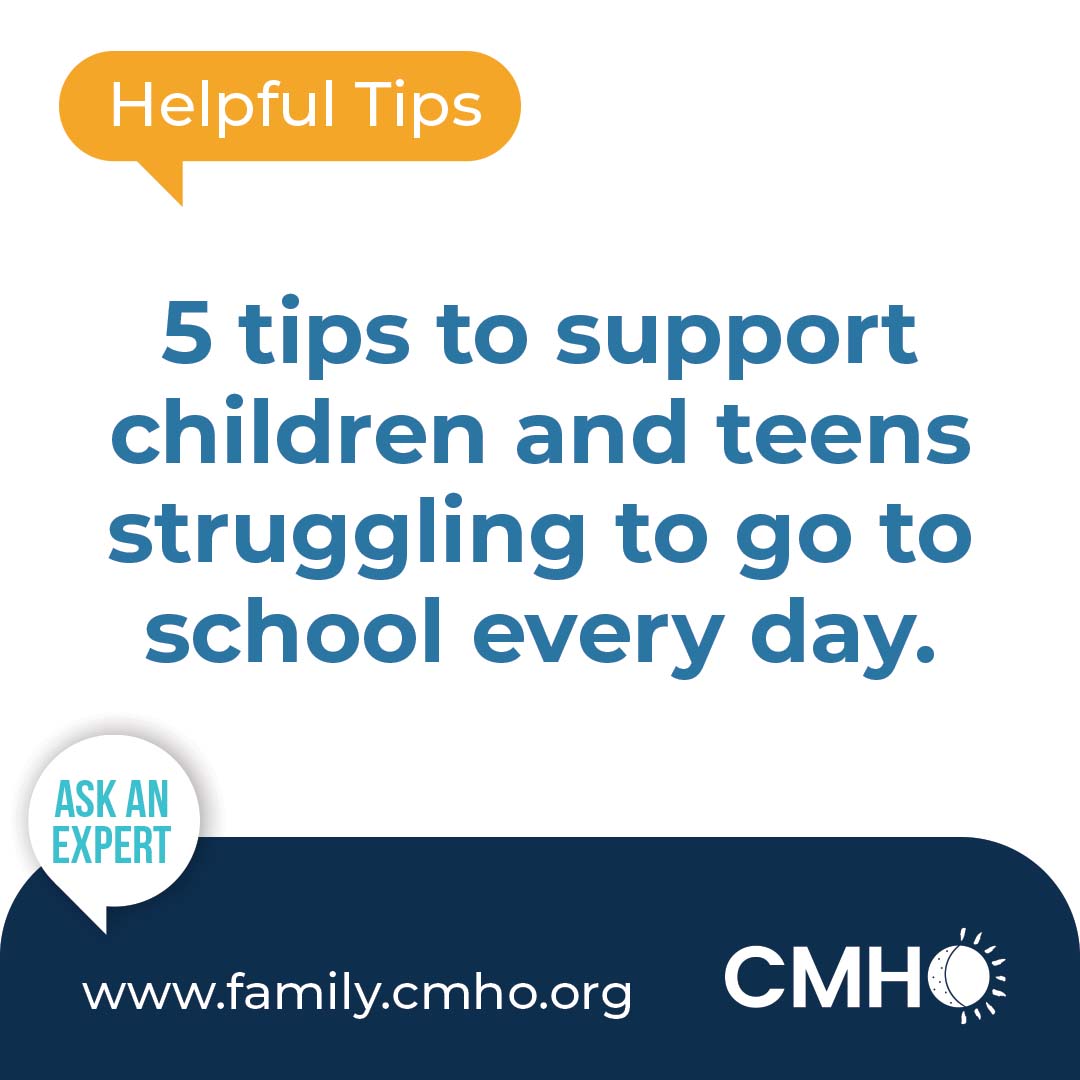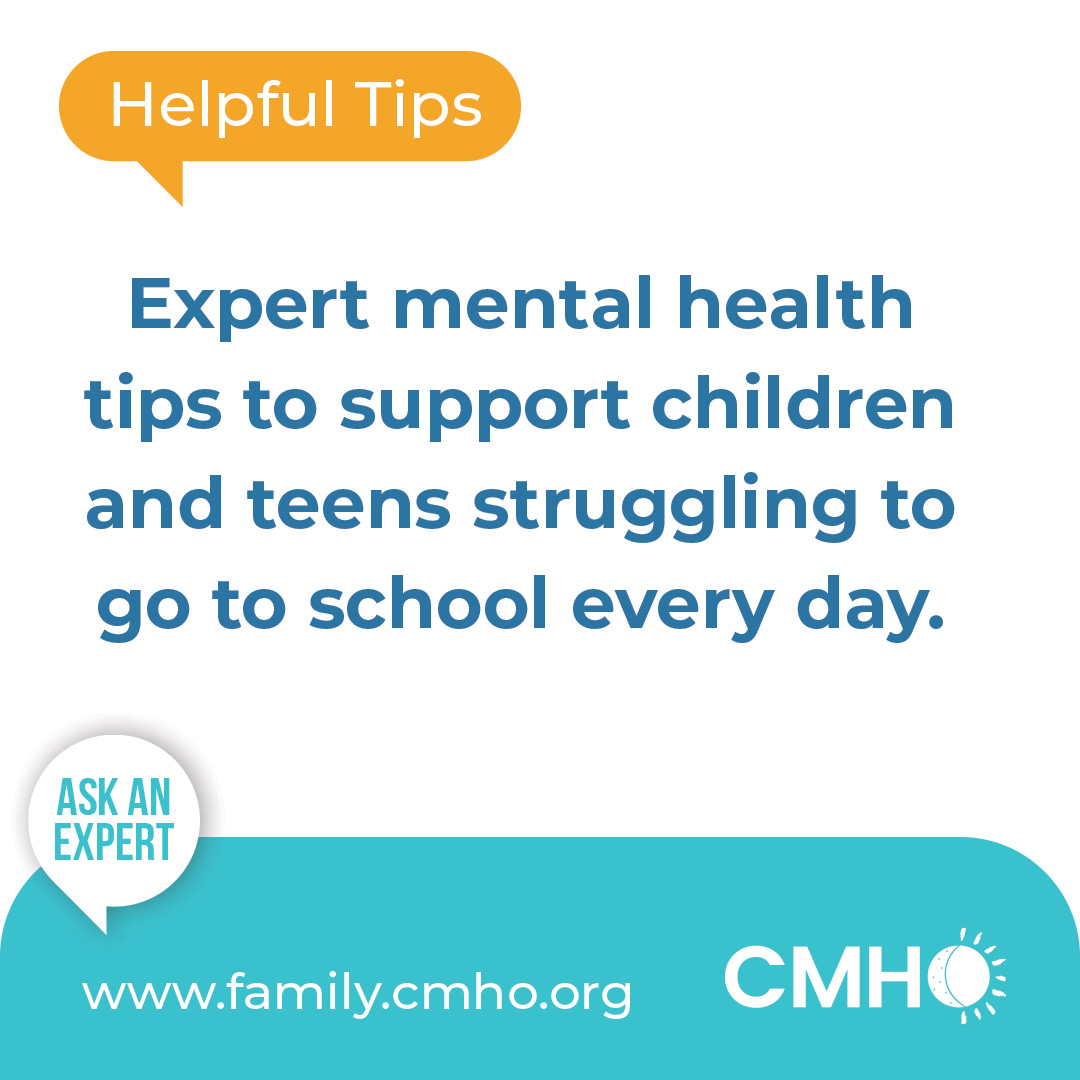School Refusal:
Supporting kids who avoid school
We understand how challenging it can be for families when a child refuses to go to school.
As parents and caregivers, we know that, in most cases, our children need to be in school. It’s not only academics that are important, but school is where they learn so much about socializing and building relationships beyond their family.
When our children are struggling, it can impact the entire family. For example, many parents and caregivers from our PCMH peer support groups have shared that they end up being frequently late for work or they have had to miss work entirely, which can be really stressful.
We know how hard this can be. That’s why we checked in with our child and youth mental health experts for their top tips to help families whose children and youth are struggling with refusing to go or avoiding school.
Get Help
Is your child overwhelmed with uncertainties and fears about school? Are they asking a lot of questions, such as what will happen when I’m at school? What will happen at home when I am at school?
Are they having physical symptoms: headaches, sleep disturbances, refusal to sleep alone, or stomach aches that often start the night before school?
If your child consistently finds it difficult to go to school, it is important to speak to a health professional first to get a better understanding of your child’s concerns. If your doctor has ruled out physical illness, it could be that your child is struggling with mental health issues leading to their concerns about school and their refusal to attend school.
We asked PCMH parents, what does school refusal look like? Here is what they said:
- Dragging your kid out of the car and carrying them to the door
- Your kid might show up to school but request to go home
- Your kid might constantly text from the bathroom that they want to leave school
- As a parent you need to take time off or get to work late because your child/youth refuses to get ready and arrives late to school or not at all
Tips to support children and teens struggling to go to school every day
1. Focus on your relationship with your child
It’s really important for children to have at least one adult who they trust and can communicate openly with. When you have open communication with your child that means you are open to hear things that you might not agree with or like. It can be helpful to prioritize your relationship with your child over any specific action. For example, if your child says, ‘I don’t want to go to school’, that could be a time for you to say ‘ok, let’s explore this.’
Find out what they need or what they feel might make the school experience different. If we focus too much on our child’s refusal, it can create tension and could become a power dynamic. Having the parent be the one who gets to decide what the child does, in this case, may not be helpful to a child with mental health issues.
“During online learning many of the youth I work with get creative. They find that if they argue with the parents, then it’s going to be messy. So, a lot of them just turned the class on, turned the camera off, and then went back to bed. Later they said, ‘I didn’t know I had a class’ or and a lot of them dropped their courses. That’s why I say it’s really important for parents to focus more on the relationship. For the youth that feel more validated by their parents, even though they didn’t feel good about school, they were able to do their courses. They were able to tell their parents/caregivers when something at school wasn’t working for them or ask for help when they needed it. They were able to be more open to talk about their concerns.” – Sofia Pelaez, Youth and Family Counsellor, EveryMind
PCMH Parent Tip
Families need to listen to their gut – you know your child best! Mental health is more important than going to school.
2. Take time to understand the issue
Try to find out what’s causing your child’s fears and worries about school. The more information parents and caregivers have on why your child does not want to go to school, the easier it will be to offer support.
Try to think of any possible situation or circumstance that might have led to your child not wanting to be in school. For example, we know that most children and youth need predictability, but the bus ride and recess both which lack structure. Could this be the cause of your child not wanting to go to school? If this is the case, you can ask the school to build in structure for your child during these times.
Offering different possibilities might help them realize that you are concerned and are spending time thinking about this and that you understand what they are going through.
3. Be committed to the idea that staying home is not an option.
It can be really important to make it clear to your child that not going to school is not an option. For most kids, the more absences they have, the harder it is to get them back into class. Getting them to school is one of the most important strategies, even if they do not stay for the entire day. If your child chooses to do school online, help them to make sure they have a plan in place when it comes to their routine, attendance and work.
Try to validate your child’s feeling before moving on to working on identifying solutions. But It might be helpful to acknowledge their distress and offer your child reassurance that they can cope in challenging situations. It may be helpful to offer coping strategies that you have seen work for them or may have worked for you in the past.
4. Try a scaffolding approach to get your child back to school.
We are all trying to do our best and that can be true when it comes to your child’s feelings about school. If your child/teen has already missed many days, it might be unrealistic to expect them to go back to attending full-time all at once. Instead, try a scaffolding approach and slowly work your child up to going back to school for the full day. For example, the first step might be to start driving by the school with your child. Then, have them agree to attend their most favorite two classes. These will likely not be academic courses, but that’s ok! The goal is to reengage your child into the routine of going to school.
PCMH Parent Tip
Supporting a child who is returning after an extended absence
- Increased monitoring of daily attendance – students may still be missing a lot of days, but not enough to be flagged, this is important, so they don’t slip through the cracks
- Have the school require documentation for legitimate absences such as a doctor’s note when several days are missed in a row
- Use a school support plan to help students feel supported about their reintegration back into the school, rewards and penalties for attendance and nonattendance.
- Look at increasing extracurricular activities
- Consider what your child was once interested in and foster that
5. Connect with the school
We know how hard it can be to share with others when your child has a mental health issue. Too many families continue to report feeling stigmatized and judged when their child is suffering. However, it can be very helpful to share with school officials that your child has a mental health challenge. That way, teachers and administration will better understand the need for some of the accommodations your child might need to reengage with the school routine.
The relationship between your child and their teacher is really important. Look for ways to encourage that relationship. For example, let the teacher know it’s ok to send your child a message that they are missed in class. This might help your child feel supported when they return. You might also let your teacher know when they have coping techniques, for example, taking a walk outside or in the hallway to decompress and work through their anxiety in a quieter environment. Please see our section on for more helpful tips and ideas.
Read more on Best Practices for Parents and Schools Supporting Students with Mental Health Challenges from PCMH parents.
PCMH Parent Tip
Success in school is not getting straight A’s, it is a period in your child’s life that we hope can be meaningful for them, but we know can be a challenge. The goal is to attend school with consistency, navigating the social environments without feeling overwhelmed with anxiety. School is not everyone’s favourite place. We hope it can be a safe place, a space where they have a positive experience and a starting point for kids/youth to venture into adulthood with the skills to set their own path.
Our experts answer your questions
In this Q-A, child and youth mental health experts answer more questions about supporting our children when they are avoiding school or refusing to go.
What is school refusal?
School refusal is absenteeism and is associated with emotional distress, it can also be coincided with other mental health challenges. For example, if a child suffers from social anxiety, it is important to get a diagnostic assessment because if mental health challenges remain unaddressed, it will be hard to get a child to go to school until the underlying mental health challenges are addressed.
School refusal is oftentimes prominent during transition periods mainly in children between the ages of 5-7 years and 11-14 years old. Other times when children/youth may be exhibiting school refusal can be in major life transitions such as a move to a new home and a new school, loss of a close friend or caregiver, or parent separation.
If the child is absent from school and there is no medical reason for the child to stay home, then this is a case of school refusal. This may vary in frequency from one or two days a month to weeks or months at a time – Deb Chiodo, Ph.D., Centre for Addiction and Mental Health (CAMH)
With hybrid learning at my school, my child is choosing to stay home more than I think they should. Should I be concerned?
This has become an issue many child and youth mental health workers have noticed in areas where classes are offered remotely and in-person simultaneously. Clinicians note that some older kids are using the online platform as a backup for when they don’t want to go to school (ie, because they feel anxiety) as opposed to staying connected when they are feeling sick, which is the intent of the remote classroom in this case. This is different than kids who have chosen remote learning for the year and are consistent in their day-to-day.
If children/youth keep choosing to spend days remote learning instead of going in-person, there is a chance their avoidance will get worse – Karene Martin-Russell, Child and Family Clinician, EveryMind.
What are more examples of ‘scaffolding’ in regard to helping my child with school?
The idea behind scaffolding is that little steps will get your child more and more comfortable with the idea of going to school. It is important to keep school at top of mind, especially when your child is at home but should be at school. Focus the conversation on things such as how they feel when they are at school, talk about what it would look like when they return to school, how they would find their friends or find their class, and reassure them that they can using coping strategies to stay at school for the entire day.
Here’s what scaffolding might look like for younger kids: A parent or caregiver stays in the classroom and gradually decreases the time spent in the classroom, over a week or more, to a point where the child can go to the classroom without the parent being present.
Scaffolding for older kids: A parent or caregiver drives by the school with the child, the next day the child/youth attends their favorite class, and on the third day they stay the whole day.
There is no exact formula on the length of time to achieve the desired results. As a parent you know your child best and how much you can push to achieve the desired goal without your child refusing to cooperate – Deb Chiodo, Ph.D., Centre for Addiction and Mental Health (CAMH)
How do you approach taking mental health days when needed, but not get trapped in a vicious cycle where it becomes school avoidance or school refusal?
Taking a mental health day is a choice each family needs to make for themselves, and what works best for them. It is important to know that it can be a slippery slope. Instead, you can let your child know when the next PD Day is scheduled, which typically happens every month. This can give them something to look forward to.
If you choose to implement mental health days it is important to be clear on how many and what they can be used for. For example, parents have chosen to allow one day for fall/winter and one day for winter/spring and it is up to the child to decide when it is most beneficial to use that day after talking it through with their parent.
What should I do if my child doesn’t want to go to school because they are being bullied?
If your child is being bullied, it’s important to communicate this with the school and find other ways to support your child. If they keep missing school, the few connections that they may have will be affected which might add fuel to their feelings of not wanting to go to school.
Find more resources about bullying and cyberbullying on PREVNet https://www.prevnet.ca/
Is there something I can do at home to make things a little easier for my child?
Having routines in place can be really helpful to children who are struggling. When we make the home environment more predictable, children know what to expect and can feel more comfortable. Routines help children have a sense of consistency with the things that can be controlled, such as meals and physical activity. For example, having meals at a set time can help bring the family together daily. Parents who are active set an example of the importance of physical activity. Regular sleep times can also help, particularly when a child or youth is struggling to wake in the morning. Use of phones or other tech devices is something that parents can negotiate with their kids to help them get back into a more consistent sleep schedule – Sofia Pelaez, Youth and Family Counsellor, EveryMind
How do I know if my child isn’t just being lazy when they say they don’t want to go to school?
Sometimes we hear from parents and caregivers that they think their child just doesn’t want to go to school because they are being lazy or that they may be exaggerating their symptoms. Oftentimes a child may be procrastinating things, but the reason for doing so may be because they are struggling with anxiety or other mental health issues. This is one example of how focusing on the relationship and having open communication with children can help us understand what’s really going on – Sofia Pelaez, Youth and Family Counsellor, EveryMind
My child doesn’t want to go to school because they are having a hard time making friends. What can I do?
For children and youth who struggle to make friends, it is important to find opportunities for them to cultivate relationships, it can start with building strong relationships with siblings or family members and do all those things that a friend at school would do. Being engaged in extracurricular activities or volunteering, where there is a common interest, is another opportunity where children can make friends. Having good relationships helps people feel happy and being happy can promote positive mental health in everyone – Deb Chiodo, Ph.D., Centre for Addiction and Mental Health (CAMH). Read more on Peer Support…
Sometimes it can be overwhelming for kids to make friends in a large social setting. If they are able to choose one or two peers that they like, setting up play dates outside of school can be helpful.
How can I better communicate and work with the school to support my child?
We asked PCMH parents and caregivers for their advice on working with the school when a child is struggling. Here’s some ideas they shared.
- When you have education as the focus point, it is important to keep your eye on the goal. Labels don’t matter, how does your child best learn and how can you and the school set them up for success.
- Focusing on creating a positive environment for the child will avoid getting stuck in the labels. If a child needs to go to class earlier to feel comfortable or needs to sit at the back of the class, then that is the accommodation required, regardless of their diagnosis or label. The goal is to set your child up for success when they attend school.
- Have an attendance piece in the IEP. Schools should not immediately call home with the mention of a headache, it might be a social struggle.
- Create a School Support Plan. Highlight all the positive things about the student, mental health concerns, why they do some of the things they do, what their behaviour is telling you and what leads to such behaviour. It is important to identify an ally at the school who can implement the support plan when the first signs of struggling appear.
- As a parent, taking the initiative to connect with the school is a good approach and schools appreciate it.
- Work with Aboriginal Support Staff if the school has one.
- Have the support staff, who are bound by confidentiality (social worker, psychologist) to inform the school about what accommodations your child needs on a need-to-know basis. If the support staff is limited, and the child is receiving mental health services with a community agency, have the clinician speak to the school or provide a letter on what accommodations need to be made that will work for the child.
- Have a united front to share a consistent message from both home and school. Have a communication plan with scheduled touchpoints between the parent and school staff. This supports the united front. If there is a damaged relationship between the school and the parent, it is important to repair this. Otherwise, the student will have a challenge to know who to align with.
- Be curious about what adult they feel connected to at school, if they have someone seek that teacher out. Have you called the school and talked to their learning support/resource teacher yet? Have you considered lowering their course load or seeking accommodations? Sometimes in order to support the mental health of our kids we have to think outside of the box.
Read more on Best Practices for Parents and Schools Supporting Students with Mental Health Challenges from PCMH parents
What else can I do to support my child?
We asked PCMH parents and caregivers for their advice on supporting a child is struggling. Here’s some ideas they shared.
- When a child has been absent for a substantial number of days or a prolonged period of time, the work can become insurmountable. At this point it is important to reach out to the school to devise a plan and understand what work has to get done in order to receive the credit.
- In younger kids this is also important, but instead, you can ask which concepts a child needs to fully grasp to be prepared for the following year. If this is not addressed, it will become another reason for the child not to want to go to school.
- Build resiliency in your child, school does have its challenges, but there is a way to problem solve. Modelling is key to show how to problem solve with school challenges.
- Help your child/youth find their voice, role play and practice on how they can state their needs.
- If your child/youth is not compliant with the intervention method chosen to support their return to school keep tweaking the plan until it fully meets their needs.
- Family members who the child/youth have a good rapport with, might be good supports to get involved. – From PCMH parents and caregivers
What do I do if my child needs more help?
If your child/youth lacks self confidence in their ability to cope with the distress experienced when at school look into therapy that helps with coping skills. Cognitive behavioral therapy (CBT), relaxation therapy or social skills training treatment, could make a difference for your child. Connect with your School Mental Health Lead (https://smho-smso.ca/about-us/find-your-mental-health-leader/) and the School Boards’ psychologist who would be able to offer resources and supports. – Deb Chiodo, Ph.D., Centre for Addiction and Mental Health (CAMH)
Click here to find help.
How do I deal with my 16-year-old son who has refused to go to school for 9 consecutive days now?
Here are some parent-to-parent tips from Vicki from Parents for Children’s Mental Health (PCMH).
Remember that most kids don’t want to spend their life lying in bed! They know that is not healthy; try to take care of them like you would if they had the flu. Make their favourite comfort food and call them down to eat it when it’s ready. Don’t be discouraged if they don’t come, just keep trying. They will see that you love them and care. You can also acknowledge that you see they are struggling/ validate that you see them. For example, you might say: ‘I can see that the thought of going to school seems so impossible today. Or, you must be feeling really awful, you aren’t alone, I’m right here with you and will help you through this.’
How can I support my teen who is avoiding school?
For teens that don’t want to go to school, it can be hard to get them to do that. But it’s important to remember that there are real feelings involved. So, have a conversation with them about your expectations that they’re going to school every day and trying their best that they’re not sitting at home on devices and things like that. You can remove the devices during the school day so that that’s less of a temptation for them. Cut off the internet or just take the stuff and lock it up until the end of the school day so that you’re really not encouraging that behavior. Then have a conversation about how they’re feeling. Why is it that they don’t want to go to school or sometimes just having that conversation can start them thinking about maybe it’s not as bad. It could be readjusting or COVID, it could be the work. It could be that maybe they just aren’t motivated anymore. Setting up things, like getting the devices at the end of the school day, hanging out with a friend of the weekend, or even a bigger gift if they have good grades— that can really help as well. And having those conversations can help you decide if you need some more professional mental health support. Somebody who can help talk to your child and support getting them motivated, or just talk to them about their mental health needs. – Karene Martin-Russell, Child and Family Clinician, EveryMind
How can I manage my own stress when my child is refusing to go to school?
Here are some parent-to-parent tips from Vicki from Parents for Children’s Mental Health (PCMH).
Be curious about what is causing your own stress to rise in this situation. What can you do to let go of some of this? Often, we place expectations on ourselves that we need to reconsider as well. For example, if you have work obligations that are being impacted, what can you do to seek accommodations for the moment? Are you worried about what others will think about you as a parent whose child isn’t going to school? Who else in your family or network of friends could help your family? What can you do to make time for yourself – even just 15 minutes a day – so that you can take a break to breathe? Consider joining a PCMH peer support group to connect with other parents who may have been through this, too.
Thank you!
Thank you to child and youth mental health workers for sharing your expert advice.
Parents and Chapter Leaders, PCMH
Deb Chiodo, Ph.D., Centre for Addiction and Mental Health (CAMH)
Karene Martin-Russell, Child and Family Clinician, EveryMind
Sofia Pelaez, Youth and Family Counsellor, EveryMind
Michael Borges, Mental Health Therapist, Maltby Centre
Ask us anything
What would you confidentially like to ask a child and youth mental health expert?

Please note that we will do our best to answer as many questions as possible but may not be able to respond to all. Also, if you ask a question, we will not share your identity.
Please note that our organization does not directly provide mental health services. To find a Children’s Mental Health Centre near you, click here. If you are in a crisis, please call 911 or go to your nearest Emergency Department.
Share this resource
We want to help as many parents and caregivers as possible. Help spread the word.



